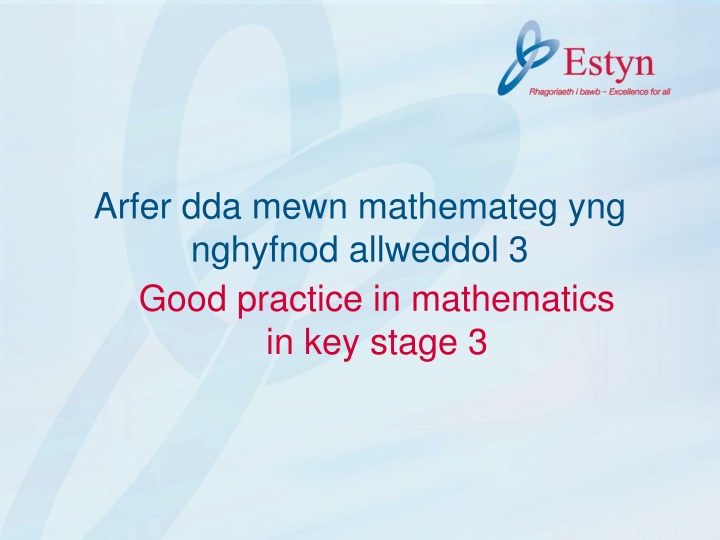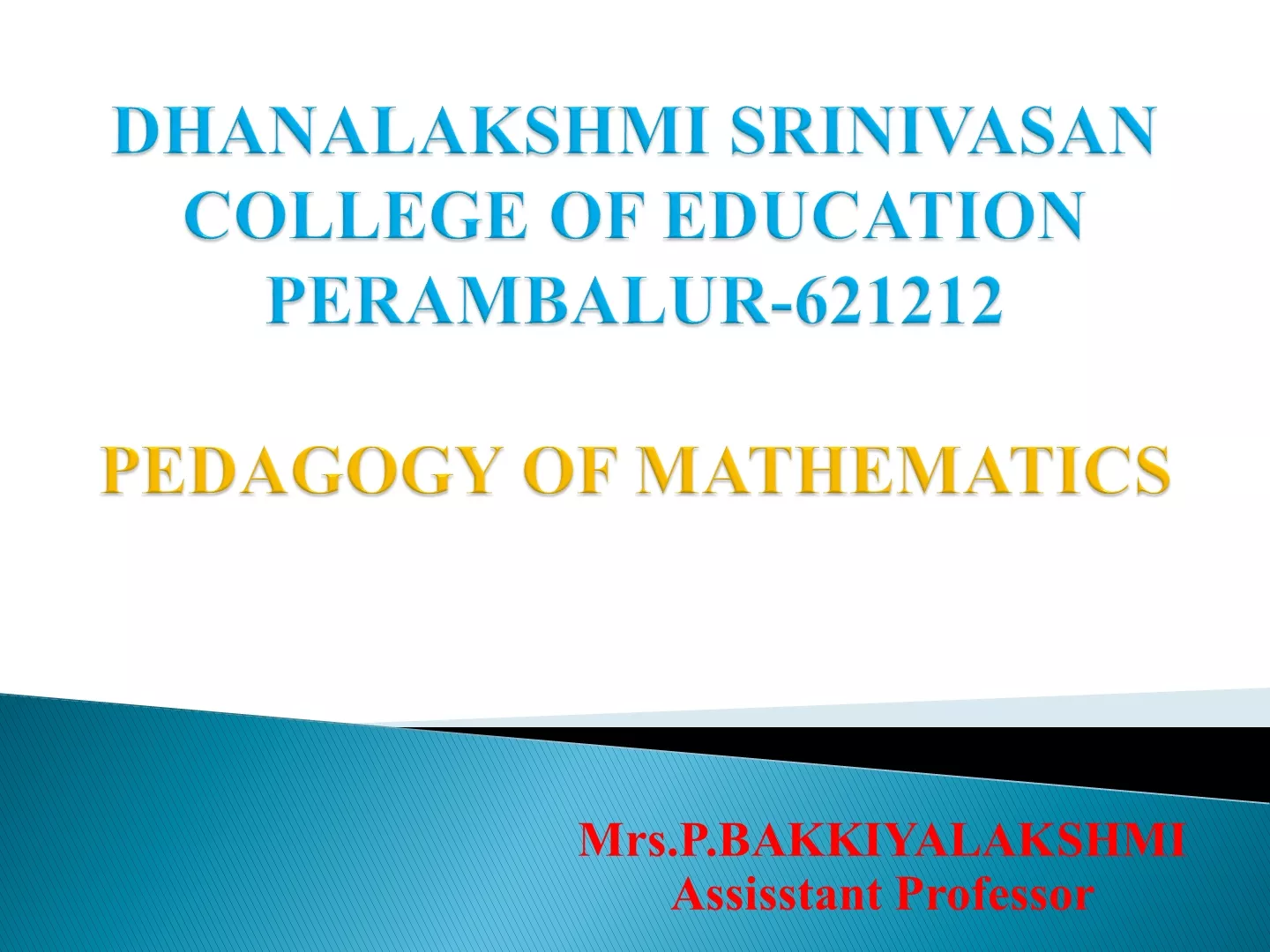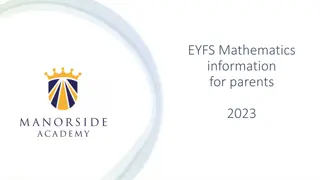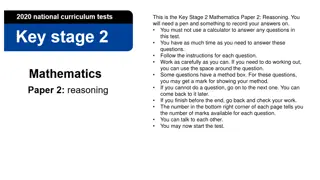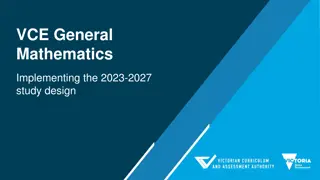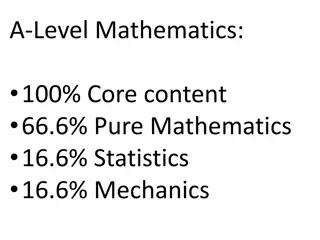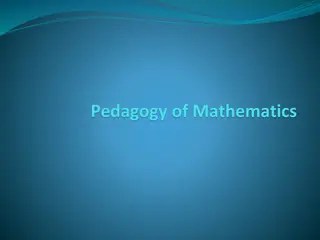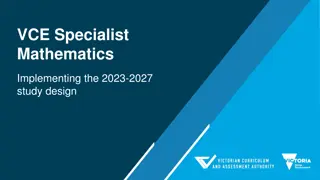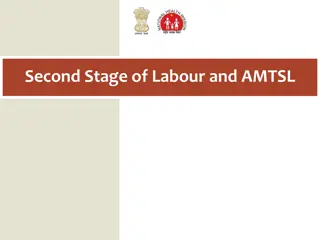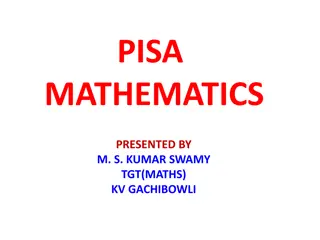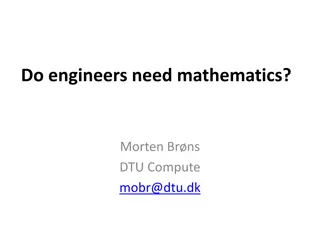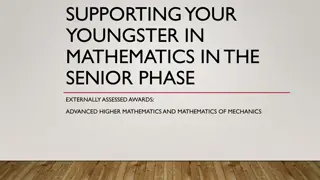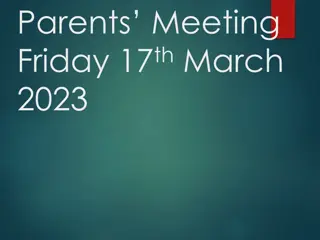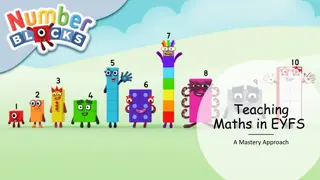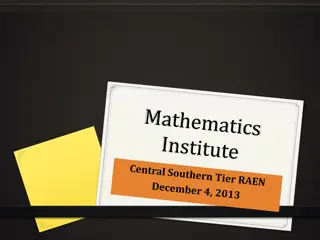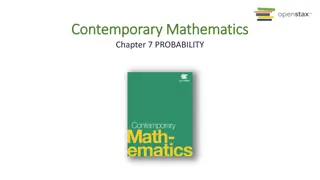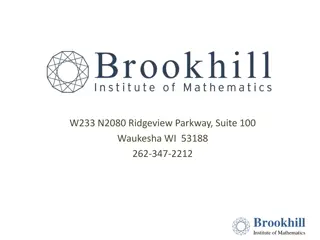Supporting Mathematics Development in Key Stage 3
Good practice in mathematics is essential for students in key stage 3 to develop strong numeracy skills that can be applied across the curriculum. The Welsh Government's initiatives aim to improve mathematical proficiency among all pupils, especially focusing on higher-level skills and problem-solving abilities. Despite improvements, challenges remain in ensuring all students reach expected mathematical levels by the end of key stage 3.
Download Presentation

Please find below an Image/Link to download the presentation.
The content on the website is provided AS IS for your information and personal use only. It may not be sold, licensed, or shared on other websites without obtaining consent from the author.If you encounter any issues during the download, it is possible that the publisher has removed the file from their server.
You are allowed to download the files provided on this website for personal or commercial use, subject to the condition that they are used lawfully. All files are the property of their respective owners.
The content on the website is provided AS IS for your information and personal use only. It may not be sold, licensed, or shared on other websites without obtaining consent from the author.
E N D
Presentation Transcript
Arfer dda mewn mathemateg yng nghyfnod allweddol 3 Good practice in mathematics in key stage 3
Cefndir Background Mae r adroddiad cylch gwaith yn cefnogi gweledigaeth Llywodraeth Cymru i ddatblygu gweithlu hynod fedrus ar gyfer economi arloesol. The remit supports the Welsh Governments vision for developing a highly-skilled work force for an innovative economy. Yn yr adroddiad gwaelodlin yn 2013, dywedodd Estyn fod gan lawer o ddisgyblion fedrau rhifedd gwan ac nid ydynt yn eu cymhwyso n ddigon da ar draws y cwricwlwm. In the baseline report published in 2013 Estyn reported that many pupils have weak numeracy skills and do not apply them well enough across the curriculum. Yn yr adroddiad rhifedd dros dro a gyhoeddwyd yn 2014, dywedodd Estyn fod disgyblion yn dechrau dangos dealltwriaeth gadarn o fedrau mathemategol. In the Interim numeracy report published in 2014 Estyn reported that pupils are beginning to show a secure grasp of mathematical skills.
Cefndir Background Nid yw disgyblion mwy abl yn datblygu eu medrau mathemategol lefel uwch yn ddigon da na u medrau rhesymu a datrys problemau estynedig. More able pupils do not develop their higher-level mathematical skills well enough or their extended reasoning and problem-solving skills. The Welsh Government has taken a number of actions to address concerns about the standards in mathematics and numeracy and has recently introduced a number of high profile initiatives. Mae Llywodraeth Cymru wedi cymryd nifer o gamau i fynd i r afael phryderon am y safonau mewn mathemateg a rhifedd ac mae wedi cyflwyno nifer o fentrau proffil uchel yn ddiweddar.
Prif ganfyddiadau Main findings Yn 2014, yn l asesiadau athrawon, llwyddodd dros 84% i gyflawni lefel 5 neu n uwch mewn mathemateg ar ddiwedd cyfnod allweddol 3. In 2014, teachers assessed that over 84% achieved level 5 or above in mathematics at the end of key stage 3. An improvement of 10 percentage points since 2009. Gwelliant o 10 pwynt canran er 2009. In Wales pupils eligible to free school meals are significantly less likely to achieve level 5 or above at the end of key stage 3 Yng Nghymru, mae nifer y disgyblion sy n gymwys i gael prydau ysgol am ddim gryn dipyn yn llai tebygol o gyflawni lefel 5 neu n uwch ar ddiwedd cyfnod allweddol 3.
Prif ganfyddiadau Main findings Yn 2013, roedd canran y disgyblion yng Nghymru sy n cyflawni lefel 5 neu n uwch yr un fath Lloegr; fodd bynnag, ar lefel 7 ac yn uwch, perfformiodd Lloegr yn well na Chymru o 10 pwynt canran. In 2013, the percentage of pupils in Wales attaining level 5 or above was the same as England, however, at level 7 and above England outperformed Wales by 10 percentage points. The PISA results in 2012 reported that boys in Wales significantly outperformed girls in mathematics, this is at odds with key stage 3 assessment where girls consistently outperform boys. Yn l canlyniadau PISA yn 2012, perfformiodd bechgyn yng Nghymru gryn dipyn yn well na merched mewn mathemateg; mae hyn yn anghyson ag asesiadau cyfnod allweddol 3 lle mae merched yn perfformio n well na bechgyn yn gyson.
Prif ganfyddiadau Main findings Roedd safonau cyflawniad yn dda neu n well ym mwyafrif y gwersi y gwnaed arolwg ohonynt. Pan roedd safonau n ddigonol, roedd disgyblion yn araf yn galw dysgu blaenorol i gof, nid oeddent yn gallu gwneud cysylltiadau rhwng testunau ac nid oeddent yn astudio gwaith oedd yn addas ar gyfer eu hanghenion nac yn eu hymestyn ddigon. Mae r addysgu n dda neu n well ym mwyafrif y gwersi mathemateg a arsylwyd ar gyfer yr arolwg hwn. Yn y gwersi hyn, mae gan athrawon wybodaeth bynciol gadarn ac maent yn cynllunio gwersi ag amcanion clir. Standards of achievement were good or better in the majority of lessons surveyed. Where standards are adequate pupils were slow to recall prior learning, unable to make connections between topics and did study work suitable for their needs or stretch them enough. Teaching is good or better in the majority of mathematics lessons observed for this survey. In these lessons teachers have secure subject knowledge and plan lessons with clear objectives.
Prif ganfyddiadau Main findings Mewn rhai gwersi, nid yw disgyblion yn gwneud digon o gynnydd am nad yw cynnwys y wers yn adeiladu ar ddysgu blaenorol. I r gwrthwyneb, ni chaiff disgyblion mwy abl eu herio n ddigonol gan fod testunau cynharach yn cael eu hailadrodd yn ormodol neu nid ydynt yn cael digon o gyfle i archwilio mathemateg trwy ddysgu n annibynnol. Ni chaiff disgyblion ddigon o gyfleoedd i gymhwyso ac ymestyn eu gwybodaeth a u medrau i ystod eang o gyd- destunau datrys problemau. In a few lessons, pupils do not make enough progress because the lesson content does not build on previous learning. Conversely, more able pupils are not challenged sufficiently because of too much repetition of earlier topics or do not have sufficient opportunity to explore mathematics through independent learning. Pupils do not have enough opportunities to apply and extend their knowledge and skills to a wide range of problem solving contexts.
Prif ganfyddiadau Main findings Many mathematics departments have developed a network for sharing good practice and have strong relationships with their local primary schools In a few cases a shortage of suitably qualified and experienced mathematics teachers is restricting curriculum arrangements In a few schools there are important shortcomings in assessment and tracking processes. Mae llawer o adrannau mathemateg wedi datblygu rhwydwaith ar gyfer rhannu arfer dda ac mae ganddynt berthnasoedd cryf u hysgolion cynradd lleol Mewn rhai achosion, mae prinder athrawon mathemateg cymwys a phrofiadol yn cyfyngu ar drefniadau r cwricwlwm Mewn rhai ysgolion, ceir diffygion pwysig mewn prosesau asesu ac olrhain.
Prif ganfyddiadau Main findings Ym mwyafrif yr ysgolion yr ymwelwyd nhw, mae arweinyddiaeth mewn mathemateg yn dda neu n well. Yn yr ysgolion hyn, mae penaethiaid adrannau mathemateg yn gweithio n agos u staff, gan gyfleu disgwyliadau uchel ar gyfer deilliannau disgyblion ac yn sicrhau bod gan bob un o r staff ddealltwriaeth gadarn o ddulliau addysgu o ansawdd uchel. Ym mwyafrif yr ysgolion, mae staff sy n addysgu mathemateg yn elwa ar ystod o gyfleoedd datblygiad proffesiynol i wella ansawdd eu haddysgu. In the majority of schools visited, leadership of mathematics is good or better. In these schools, heads of mathematics departments work closely with their staff, communicating high expectations for pupil outcomes and ensuring all staff have a secure understanding of high quality teaching methods. In the majority of schools, mathematics teaching staff benefit from a range professional development opportunities to improve the quality of their teaching.
Argymhellion Recommendations Dylai adrannau mathemateg: fonitro perfformiad disgyblion sy n gymwys i gael prydau ysgol am ddim a chynnig ymyriadau targedig yn l yr angen bodloni anghenion disgyblion sy n cael anawsterau neu sy n fwy abl cynyddu lefel yr her i bob disgybl trwy wneud yn siwr bod: - gwersi n cael eu strwythuro i ennyn diddordeb, cymell ac ymestyn pob un o r disgyblion medrau datrys problemau mathemategol yn cael eu datblygu a u cymhwyso mewn ystod eang o gyd- destunau bywyd go iawn Mathematics departments should: monitor the performance of pupils eligible for free school meals and offer targeted interventions as necessary meet the needs of pupils who experience difficulties or are more able increase the level of challenge for all pupils by making sure that: - lessons are structured to engage, motivate and stretch all pupils - mathematical problem-solving skills are developed and applied to a wide range of real-life contexts
Argymhellion Recommendations sicrhau bod gweithdrefnau asesu ac olrhain yn drylwyr ensure that assessment and tracking procedures are robust improve departmental self- evaluation and improvement planning gwella hunanarfarnu a chynllunio gwelliant adrannol share best practice across the school and evaluate new ways of working rhannu arfer orau ar draws yr ysgol ac arfarnu ffyrdd newydd o weithio
Argymhellion Recommendations Dylai awdurdodau lleol a chonsortia rhanbarthol: hwyluso rhwydweithiau ar gyfer rhannu arfer orau rhwng adrannau mathemateg Local authorities and regional consortia should: facilitate networks for sharing best practice between mathematics departments provide support, challenge and professional development opportunities for mathematics departments and individual teachers darparu cymorth, her a chyfleoedd datblygiad proffesiynol ar gyfer adrannau mathemateg ac athrawon unigol
Argymhellion Recommendations Dylai Llywodraeth Cymru: The Welsh Government should: investigate the difference in outcomes between boys and girls in mathematics ymchwilio i r gwahaniaeth mewn deilliannau rhwng bechgyn a merched mewn mathemateg address shortages in the supply of qualified mathematics teachers mynd i r afael r prinder yn y cyflenwad o athrawon mathemateg cymwys
Arfer orau Best practice Ysgol Gyfun Gatholig y Cardinal Newman, Rhondda Cynon Taf Ffocws: trosglwyddo o gyfnod allweddol 2 i gyfnod allweddol 3 Mae gan yr ysgol berthynas gref i hysgolion cynradd partner, ac mae gweithgareddau pontio yn dechrau ym Mlwyddyn 5. Penodwyd aelod o adran fathemateg yr ysgol ar gontract hanner amser i rannu arfer dda mewn addysgu a dysgu a gweithio gydag ysgolion cynradd i gyflymu cynnydd disgyblion pan fyddant yn cyrraedd cyfnod allweddol 3. Ariennir y swydd hon yn bennaf gan yr ysgol uwchradd, er bod pob ysgol gynradd wedi cyfrannu at gost y prosiect hwn. Un o nodau allweddol y prosiect pontio yw sicrhau bod disgyblion yn cael dechrau gwych yng nghyfnod allweddol 3 mewn mathemateg. Mae athrawon mathemateg ym mhob un o r ysgolion cynradd a r ysgol uwchradd wedi mynychu gweithgareddau datblygiad proffesiynol ar y cyd. Mae hyn wedi gwella r defnydd o fethodoleg gyffredin mewn mathemateg a rhannu arfer dda ar draws yr ysgolion. Ym Mlwyddyn 7, mae tua hanner y tiwtoriaid dosbarth yn athrawon mathemateg hefyd sydd, ynghyd r unigolion cyswllt pontio ar gyfer mathemateg, yn cefnogi awr rifedd yr ysgol a gynhelir ddwywaith yr wythnos a datblygiad rhifedd disgyblion yn llwyddiannus. Cardinal Newman R.C. Comprehensive School, Rhondda Cynon Taf Focus: transition from key stage 2 to key stage 3 The school has a strong relationship with its partner primary schools, with transition activities starting in Year 5. A member of the school s mathematics department was appointed to a half-time contract to share good practice in teaching and learning and to work with primary schools to accelerate the progress of pupils when they reach key stage 3. This post is funded mainly by the secondary school, although each primary school contributed to the cost of this project. A key aim of the transition project is to ensure that pupils have a flying start at key stage 3 in mathematics. Mathematics teachers at each of the primary schools and the secondary school have attended joint professional development activities. This has improved the use of common methodology in mathematics and the sharing of good practice across the schools. In Year 7, around half of the form tutors are also mathematics teachers, which, together with the transition links for mathematics, successfully supports the school s twice- weekly numeracy hour and pupils numeracy development.
10 cwestiwn i ddarparwyr 10 questions for providers Pa nodweddion da sydd yna o ran addysgu mathemateg yn ein hysgol? Sut mae gwersi n adeiladu ar ddysgu blaenorol? Pa mor dda y caiff medrau rhesymu a datrys problemau estynedig disgyblion eu datblygu? A ydym ni n rhannu arfer dda gydag ysgolion cynradd lleol ac yn dysgu oddi wrth eu harfer dda? A gaiff disgyblion eu herio n ddigonol, yn enwedig y rhai mwy abl? A oes gwahaniaeth mewn deilliannau? Pa strategaethau y mae r ysgol wedi eu defnyddio i gau r bwlch rhwng y rhywiau? What good features are there in the teaching of mathematics in our school? How do lessons build on previous learning? How well are pupils extended reasoning and problem solving skills developed? Do we share good practice with local primary schools and learn from their good practice. Are pupils sufficiently challenged particularly the more able? Is there a difference in outcomes What strategies has the school used to close the gender gap?
10 cwestiwn i ddarparwyr 10 questions for providers A oes cysondeb o ran amlder a marcio ar draws y pwnc ac a yw disgyblion yn gwybod beth mae angen iddynt ei wneud i wella? A gaiff cynnydd disgyblion ei olrhain a i fonitro yn ddigon trylwyr i sicrhau bod targedau priodol yn cael eu gosod ar gyfer disgyblion? A yw r cwricwlwm yng nghyfnod allweddol 3 yn rhoi cyfleoedd i ddisgyblion symud ymlaen i r cam dysgu nesaf? A yw ein hunanarfarnu a n cynllunio gwelliant yn ddigon trylwyr i sicrhau gwelliannau mewn mathemateg? Is there consistency in the frequency and quality of marking across the subject and do pupils know what they need to do to improve? Is the tracking and monitoring of pupils progress sufficiently robust to ensure that appropriate targets are set for pupils? Does the curriculum in key stage 3 provide pupils with opportunities to progress to the next stage of learning? Is our self-evaluation and improvement planning robust enough to secure improvements in mathematics?
Dolen gyswllt ir adroddiad llawn Web-link to full report
Cwestiynau... Questions
